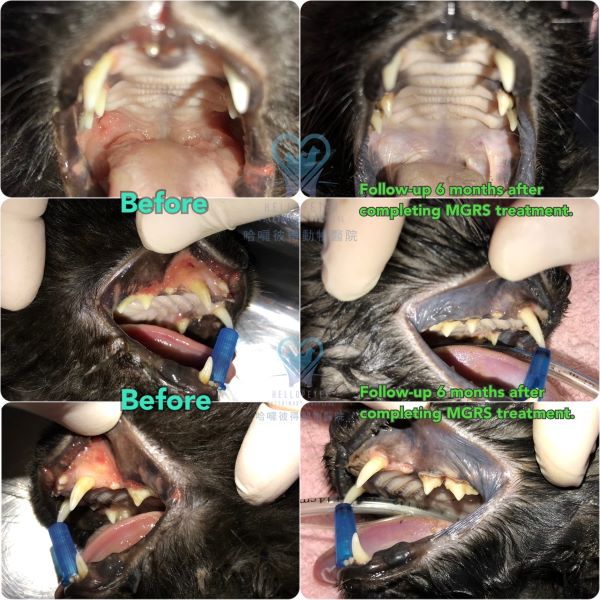
“Follow-up after 6 months of Mucogingival Replacement Surgery (MGRS) for Hei-Lu-Lu's Gingiva and Oral Mucosa”
At the age of 1.5 years, Hei-Lu-Lu (the word mean ”pitch black”) , a black cat carrying the Feline Herpesvirus (FPV), suffered from severe Feline Chronic Gingivostomatitis (FCGS) with concurrent severe periodontal disease. The condition was successfully treated by Dr. Chung-Wei Chen (Dr. Richard Chen) through Mucogingival Replacement Surgery (MGRS), without extracting any teeth. (For information on Hei-Lu-Lu's previous treatment records, please refer to the following link: https://www.hellopeter.com.tw/content-177.html)
Six months after the completion of the MGRS, Hei-Lu-Lu, now 2.5 years old, returned to our hospital for a follow-up. The oral and gingival conditions remained excellent, with no recurrence of FCGS. The body weight increased from 3.1kg six months ago to 3.85kg, and there was a significant improvement in the quality of life.
As Hei-Lu-Lu also suffered from severe periodontal disease, Dr. Chen reminded the owner once again to brush the cat's teeth daily and undergo regular dental scaling to maintain good oral hygiene and ensure oral health.
Once again, we would like to express our gratitude to the animal hospital in Taipei for referring this case to our hospital for treatment.
Feline chronic gingivostomatitis (FCGS) is one of the common oral diseases in cats. The main symptoms are:
1. The gingiva and oral mucosa are red, swollen, ulcers or hyperplasia. All soft tissues in the mouth, including the gingiva and all parts of the oral mucosa (including buccal, lingual, sublingual and oropharynx, etc.), will have redness, ulceration or hyperplasia.
2. Cats will lose their appetite or even refuse to eat because of mouth pain, or they will keep shaking their heads and scratching their mouths with their front feet when eating and drinking.
3. The patient's saliva usually has a peculiar smell, even putrefactive odor, due to ulcers.
At present, the most common treatments are long-acting steroid injections or oral steroids, combined with antibiotics, and tooth extraction, etc., but the effect of individual treatment varies greatly, furthermore, tooth extraction will likely cause the cat's oral cavity to collapse and alveolar bone loss. They need lifelong medication and can't stop it.
Dr. Chung-Wei Chen's original Mucogingival Replacement Surgery (MGRS) aims to solve the above-mentioned sequelae and difficulties in the treatment of stomatitis, and make cats with FCGS no longer need to take medicine for a long time after recovery, and return to the normal life they had before the illness.
If you want to see more cat patients cured by MGRS in our hospital, please refer to our official website (www.hellopeter.com.tw/contents-4. html) or Facebook fan page album (www.facebook.com/media/set/?set=a.1308046286294231&type=3).



